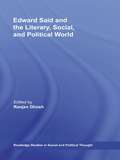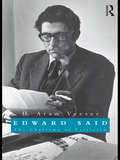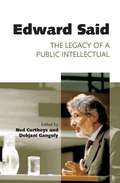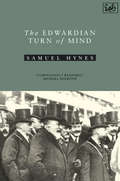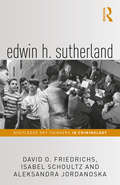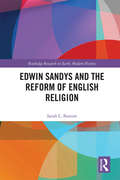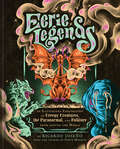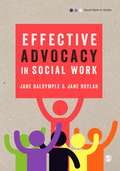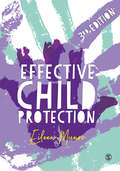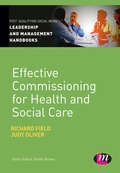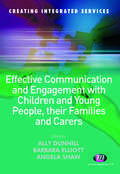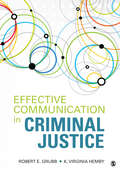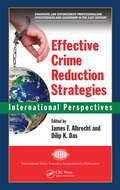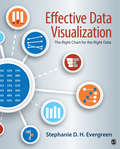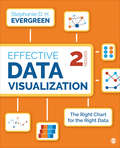- Table View
- List View
Edward Said and the Literary, Social, and Political World (Routledge Studies in Social and Political Thought)
by Ranjan GhoshEdward Said is widely recognized for his work as a critic and theorist of Orientalism and the Palestine crisis, but far less attention has been devoted to his considerable body of literary and cultural criticism. In this edited collection, the contributors - many among the foremost Said scholars in the world - examine Said as the literary critic; his relationship to other major contemporary thinkers (including Derrida, Ricoeur, Barthes and Bloom); and his involvement with major movements and concerns of his time (such as music, Feminism, New Humanism, and Marxism). Featuring freshly carved out essays on new areas of intervention, the volume is an indispensable addition for those interested in Edward Said and the many areas in which his legacy looms.
Edward Said and the Work of the Critic: Speaking Truth to Power
by Paul A. BovéFor at least two decades the career of Edward Said has defined what it means to be a public intellectual today. Although attacked as a terrorist and derided as a fraud for his work on behalf of his fellow Palestinians, Said's importance extends far beyond his political activism. In this volume a distinguished group of scholars assesses nearly every aspect of Said's work--his contributions to postcolonial theory, his work on racism and ethnicity, his aesthetics and his resistance to the aestheticization of politics, his concepts of figuration, his assessment of the role of the exile in a metropolitan culture, and his work on music and the visual arts. In two separate interviews, Said himself comments on a variety of topics, among them the response of the American Jewish community to his political efforts in the Middle East. Yet even as the Palestinian struggle finds a central place in his work, it is essential--as the contributors demonstrate--to see that this struggle rests on and gives power to his general "critique of colonizers" and is not simply the outgrowth of a local nationalism. Perhaps more than any other person in the United States, Said has changed how the U. S. media and American intellectuals must think about and represent Palestinians, Islam, and the Middle East. Most importantly, this change arises not as a result of political action but out of a potent humanism--a breadth of knowledge and insight that has nourished many fields of inquiry. Originally a special issue of boundary 2, the book includes new articles on minority culture and on orientalism in music, as well as an interview with Said by Jacqueline Rose. Supporting the claim that the last third of the twentieth century can be called the "Age of Said," this collection will enlighten and engage students in virtually any field of humanistic study. Contributors. Jonathan Arac, Paul A. Bov, Terry Cochran, Barbara Harlow, Kojin Karatani, Rashid I. Khalidi, Sabu Kohsu, Ralph Locke, Mustapha Marrouchi, Jim Merod, W. J. T. Mitchell, Aamir R. Mufti, Jacqueline Rose, Edward W. Said, Gayatri Chakravorty Spivak, Lindsay Waters
Edward Said: The Charisma of Criticism
by H. Aram VeeserThis insightful critical biography shows us an Edward Said we did not know. H. Aram Veeser brings forth not the Said of tabloid culture, or Said the remote philosopher, but the actual man, embedded in the politics of the Middle East but soaked in the values of the West and struggling to advance the best European ideas. Veeser shows the organic ties connecting his life, politics, and criticism. Drawing on what he learned over 35 years as Said's student and skeptical admirer, Veeser uses never-before-published interviews, debate transcripts, and photographs to discover a Said who had few inhibitions and loathed conventional routine. He stood for originality, loved unique ideas, wore marvelous clothes, and fought with molten fury. For twenty years he embraced and rejected, at the same time, not only the West, but also literary theory and the PLO. At last, his disgust with business-as-usual politics and criticism marooned him on the sidelines of both. The candid tale of Said's rise from elite academic precincts to the world stage transforms not only our understanding of Said—the man and the myth—but also our perception of how intellectuals can make their way in the world.
Edward Said: The Legacy of a Public Intellectual
by Ned Curthoys Debjani GangulyThis collection is an enterprise of discovery and critical inquiry into the legacy of one of late modernity's greatest public intellectuals, Edward Said.Noted contributors, including Bill Ashcroft, John Docker, Lisa Lowe, Hsu-ming Teo and Patrick Wolfe, address an array of intellectual, political and cultural issues in their engagement with Said's oeuvre. Exciting new scholarship highlights the ways in which humanities in the twenty-first century can engage with Said's legacy, which includes his imbrications of culture and imperialism, his cosmopolitan critique of the idea of 'clash of civilisations', and his belief that the intellectual needs to maintain 'intellectual performances' on many fronts.The individual chapters achieve a sense of balance between the two poles of Said's persona: the brilliant and intimidating literary and music critic who invested deeply in an inclusive and democratic vision of humanism and the outspoken public intellectual who kept alive the truth of Palestine and the dangers of a settler colonial ethos.
Edwardian Turn Of Mind
by Samuel HynesThe Edwardian Turn of Mind brilliantly evokes the cultural temper of an age. The years between the death of Queen Victoria and the outbreak of the First World War witnessed a turbulent and dramatic struggle between the old and the new. Samuel Hynes considers the principal areas of conflict - politics, science, the arts and the relations between men and women - and fills them with a wide-ranging cast of characters: Tories, Liberals and Socialists, artists and reformers, psychoanalysts and psychic researchers, sexologists, suffragettes and censors. His book is a portrait of a tumultuous time - out of which contemporary England was made.
Edwardians on Screen: From Downton Abbey to Parade’s End
by Katherine ByrneThis book explores television's current fascination with the Edwardian era. By exploring popular period dramas such as Downton Abbey , it examines how the early twentieth century is represented on our screens, and what these shows tell us about class, gender and politics, both past and present.
Edwin H. Sutherland (Routledge Key Thinkers in Criminology)
by David O. Friedrichs Isabel Schoultz Aleksandra JordanoskaEdwin H. Sutherland is widely identified as the single most important and influential criminologist of the twentieth century. He is especially well-known for his path-breaking criminology textbook (first published in 1924), his promotion of a sociological (and scientific) approach to the understanding of crime and its control, his theory of differential association, and his work over his final ten years on white-collar crime, a term he is credited with having introduced. This book explores the contemporary meaning of Edwin Sutherland and considers why criminologists today should continue to engage with his work. What can and should Sutherland mean to future 21st century criminologists, those working in the field say between 2021 and 2050, or some one hundred years after the 1921 to 1950 period that encompassed Sutherland’s criminological career? Which dimensions of Sutherland’s work have best survived the march of time and which are most likely to – and deserve to – survive going forward? Making the case that Sutherland is important to both mainstream and critical criminologists, to positivistic criminologists and those who study crimes of the powerful, this book is essential reading for both students and scholars interested in exploring the enduring legacy of this key thinker in criminology.
Edwin Sandys and the Reform of English Religion
by Sarah L. BastowThis book examines the complexities of reformed religion in early-modern England, through an examination of the experiences of Edwin Sandys, a prominent member of the Elizabethan Church hierarchy. Sandys was an ardent evangelical in the Edwardian era forced into exile under Mary I, but on his return to England he became a leader of the Elizabethan Church. He was Bishop of Worcester and London and finally Archbishop of York. His transformation from Edwardian radical to a defender of the Elizabethan status quo illustrated the changing role of the Protestant hierarchy. His fight against Catholicism dominated much of his actions, but his irascible personality also saw him embroiled in numerous conflicts and left him needing to defend his own status.
Eerie Legends: An Illustrated Exploration of Creepy Creatures, the Paranormal, and Folklore from around the World
by Ricardo DiseñoA fascinating and frightening collection of folk tale monsters, ghosts, and other scary things that dwell in the dark.Our world is a strange place. This hauntingly illustrated book peers into the dark spaces that lie somewhere between belief and imagination, and into the weird stories we tell to make sense of where and who we are. Here are tales of vengeful ghosts, bloodthirsty monsters, internet-conjured nightmares, lost souls, cryptid curiosities, demons, aliens, the undead, and the inexplicable, including:Enfield PoltergeistJersey DevilMothmanKrampusEl SilbónBetty and Barney Hill AbductionHeadless HorsemanSkunk ApeOnryōLoabIsla de las MuñecasSlender ManLa LloronaLoch Ness MonsterAnd many more...Acclaimed artist Ricardo Diseño brings a lifelong fascination with eerie folklore to electrify the artwork depicting each spooky subject, accompanied by evocative descriptions and history and a flash-fiction story in which readers encounter the dark presences themselves.FEARFUL WONDERS FROM AROUND THE WORLD: Stalking these pages are Brazilian sleep paralysis ghouls, Japanese spider-women, a shape-shifting Slavic forest guardian, and creepy North American cryptids. Pay a visit to Madagascar’s human-eating tree, the Mexican island of haunted dolls, a ghost-cursed California mansion, and the spooky darkness of the tombs beneath the streets of Paris.FAVORITES OLD AND NEW: Including the first reported alien abduction (and the folklore root of the alien "greys") as well as the first phantom believed to be conjured by AI, this collection brings horror, occult, and classic campfire story vibes in equal measure. Entries end with a shock-fiction encounter with the monster itself or a tale told from its perspective.GORGEOUSLY ILLUSTRATED BOOK: Ricardo Diseño’s signature style brings each of the more than 30 entries to frightening life with a knockout full-page image, hand-illustrated border design elements, and a vivid spot illustration.TURN OUT THE LIGHTS: The cover art glows in the dark.Perfect for:Readers who enjoy folklore, fairy tales, and ghost storiesHorror and horror movie fansFans of Ricardo Diseño’s Classic Horror Oracle DeckGift-giving for Halloween or any occasion that celebrates the macabre and mysterious
Effective Advocacy in Social Work (Social Work in Action series)
by Jane Dalrymple Dr Jane BoylanAdvocacy is an essential skill for social workers who need to be able to speak confidently on behalf of service-users in a range of situations. In this new book, Jane Dalrymple and Jane Boylan explore the theory and research behind advocacy to demonstrate how to achieve best practice. Key topics covered include: - Independent advocacy - Supporting self-advocacy and decision-making - Challenging oppression - Negotiating with organisations Each chapter includes rich case examples, which help readers bring the discussion into the real life practice context. Effective Advocacy in Social Work will be valuable reading for those studying social work at undergraduate and postgraduate level, as well as those working in practice and in interprofessional contexts. Jane Darlymple is Senior Lecturer at the University of the West of England. Jane Boylan is Senior Lecturer at Keele University.
Effective Bullying Prevention: A Comprehensive Schoolwide Approach (The Guilford Practical Intervention in the Schools Series)
by Adam Collins Jason HarlacherGoing beyond other bullying prevention resources, this book presents an approach grounded in evidence-based best practices, together with concrete guidance for weaving it sustainably into the fabric of a school. The authors describe a range of ways to support the development of prosocial skills in K–12 students, make data-based decisions to respond to bullying, and build partnerships across students, staff, and families. Of crucial importance, the book explains how to ensure that bullying prevention efforts are implemented with fidelity and do not fade away over time. An in-depth case study illustrates what effective implementation looks like in the school setting. The large-size format facilitates photocopying; reproducible tools to support implementation can be downloaded and printed for repeated use. This book is in The Guilford Practical Intervention in the Schools Series, edited by Sandra M. Chafouleas.
Effective Child Abuse Investigation for the Multi-Disciplinary Team
by Bradley Richard GrahamChild abuse cases are unique in that they involve seldomly witnessed acts. A nonverbal victim and a silent perpetrator will often lead to a stalling of the investigation and the judicial process. Effective Child Abuse Investigation for the Multi-Disciplinary Team is a practical guide for law enforcement officers and child protection workers in abus
Effective Child Protection
by Eileen Munro`A well-written and stimulating book. . . . Child protection professionals, teachers and researchers will find this a book that both challenges and helps the reader not just be a passive recipient, but an active contributor in their own improved thinking' - YoungMinds Magazine `Eileen Munro's Effective Child Protection is a `must read' for anyone concerned with enhancing child protection practice. It directly addresses a core issue-the relationship between intuition and formal analytic thinking in decision-making and practice. Effective child protection practice requires both, and Munro provides a framework that facilitates clear thinking in the complex real world of child protection practice. It is very well written, stimulating and accessible' - Professor Ian O'Connor, University of Queensland `The definition of 'good child care social work' has been a contested one for several centuries. Enduring political and moral pressures have often obscured our understanding of what is helpful for children and their families; and have constrained the development of sound professional practice. Eileen Munro 's book performs a very valuable service in examining the context, purposes and operational requirements of effective child protection. Her analysis transcends short term panic-led responses and restores a welcome sense of proportion to the challenges involved in promoting and safeguarding the welfare of children. Social workers will find in this book, a range of reasoned, research based, and realistic pointers to good professional practice, set in a wide-ranging social and historical context. If they act on them, then children and families, with whom they work, might well get a much' - Professor Jane Tunstill Department of Science and Political Science Royal Holloway London University `This book makes some interesting points. . . useful. . . for experienced and qualified social workers' - Peter Jenkins, Healthcare Counselling and Psychotherapy Journal `It will be helpful for anyone with responsibility for deciding the child's best interests who wishes to re-appraise their approach to decision-making and to develop their capacity for critical thinking' - Community Care `This book makes a vital contribution to better decision-making in child care and will be essential reading for social workers and others in child protection' - Simon Bass, Caring Magazine 'Overall, the book is compelling reading for practitioners, administrators, and policy analysts in the field of child welfare'- Envision: The Manitoba Journal of Child Welfare 'The book makes the fully justified claim it will be essential reading for professionals undergoing qualifying and post-qualifying training. It is to be hoped that it will enjoy an even wider readership' - Child Abuse Review This book is written for anyone involved in child protection and child welfare work who is interested in how to make better childcare decisions. The author provides a clear framework on decision-making, risk assessment and reasoning in addition to helping explain and justify decisions and judgements and the sources of any disagreements. Effective Child Protection analytic and intuitive methods of reasoning and proposes a model in which each method has strengths at different points in the process. Using detailed case studies and graphics to provide memorable illustrations of key points, this book is an invaluable practical and theoretical addition to the complexities of making predictions about children's best interests and is written for social workers, nurses, police officers and health workers as well as those taking or teaching qualifying and post-qualifying courses in child protection and child care.
Effective Child Protection
by Eileen MunroEileen Munro, author of the seminal Munro Review, returns in this fully revised and updated third edition. With new chapters on 'Child Protection Agencies as Complex Adaptive Systems' and 'How organisations can support more effective practice', this new edition shifts its focus from individual workers to look at the critical role that organisations play in child protection, and how individuals are affected by the complex enterprise of people, processes, cultures and agencies. It remains an essential guide to strengthening analytic and intuitive skills to improve children's safety.
Effective Child Protection
by Eileen MunroEileen Munro, author of the seminal Munro Review, returns in this fully revised and updated third edition. With new chapters on 'Child Protection Agencies as Complex Adaptive Systems' and 'How organisations can support more effective practice', this new edition shifts its focus from individual workers to look at the critical role that organisations play in child protection, and how individuals are affected by the complex enterprise of people, processes, cultures and agencies. It remains an essential guide to strengthening analytic and intuitive skills to improve children's safety.
Effective Commissioning in Health and Social Care (Post-Qualifying Social Work Leadership and Management Handbooks)
by Dr Richard Field Ms Judy OliverIt is essential that in today's public sector, social care and health managers have a thorough and critical understanding of best practice in commissioning services. This guide has been developed to underpin core aspects of commissioning services in health and social care with tools and strategies that really work. The authors go through the commissioning process step-by-step in order to help the reader better understand the following: · The distinguishing characteristics of commissioning ; · how commissioning is affected by changes in the public sector generally and health and social care in particular; · the significant potential for improved service quality and value for money arising from commissioning; · how good commissioning can engage in productive conversations that can lead to better outcomes for patients, clients and the community. There are sections on specific skills needed for good commissioning, the challenges many face and how to approach them, and what makes a good commissioning manager.
Effective Communication and Engagement with Children and Young People, their Families and Carers (Creating Integrated Services Series)
by Ally Dunhill, Barbara Elliott and Angela ShawThis book focuses on providing information and guidance for professionals involved in the newly emerging multi-agency, interdisciplinary children′s workforce. It does so by helping them to understand the theory behind the issues relating to communication and engagement in multi-agency settings for children and families. The book is of use to both students and those already working in the sector who are undertaking professional development to enhance understanding and skills in the new children′s workforce environment.
Effective Communication in Criminal Justice
by Robert Skip Grubb K. Virginia HembyEffective Communication in Criminal Justice is the perfect companion for any criminal justice course that discusses communication and writing. Authors Robert E. Grubb and K. Virginia Hemby teach you how to be both an effective writer and communicator—essential skills for anyone interested in criminal justice. Going beyond report writing, this book helps you become more confident presenter and digital communicator while encouraging you to adapt your communication style to meet the needs of diverse populations. You will not only improve your communication and writing skills, but also gain specific strategies for succeeding in careers related to policing, courts, corrections, and private security. Key Features Specific coverage of effective communication strategies that relate to each area of criminal justice, offers you a robust overview of all aspects of communication in the criminal justice field. Unique coverage of nonverbal communication, digital communication, conflict resolution, and communication with special populations helps you learn to adapt your communication style to specific situations. Helpful checklists remind you to keep practicing good communication techniques. Real-world examples of effective communication in criminal justice show you how the concepts are relevant to your future career. End-of-chapter discussion questions and ethical issue exercises provide you with the opportunity to practice and apply the concepts covered in each chapter.
Effective Communication in Criminal Justice
by Robert Skip Grubb K. Virginia HembyEffective Communication in Criminal Justice is the perfect companion for any criminal justice course that discusses communication and writing. Authors Robert E. Grubb and K. Virginia Hemby teach you how to be both an effective writer and communicator—essential skills for anyone interested in criminal justice. Going beyond report writing, this book helps you become more confident presenter and digital communicator while encouraging you to adapt your communication style to meet the needs of diverse populations. You will not only improve your communication and writing skills, but also gain specific strategies for succeeding in careers related to policing, courts, corrections, and private security. Key Features Specific coverage of effective communication strategies that relate to each area of criminal justice, offers you a robust overview of all aspects of communication in the criminal justice field. Unique coverage of nonverbal communication, digital communication, conflict resolution, and communication with special populations helps you learn to adapt your communication style to specific situations. Helpful checklists remind you to keep practicing good communication techniques. Real-world examples of effective communication in criminal justice show you how the concepts are relevant to your future career. End-of-chapter discussion questions and ethical issue exercises provide you with the opportunity to practice and apply the concepts covered in each chapter.
Effective Communication: A Workbook for Social Care Workers
by Suzan CollinsSocial care workers in residential or domiciliary settings need to be able to communicate effectively in order to carry out their work. Supporting people with a variety of difficulties including hearing loss, impaired speech, visual impairment, dementia and physical and learning disabilities requires a range of communication skills, such as listening, sign language, writing notes, and using body language, touch and stimulation. This workbook will provide workers with the ability to enable adults with limited or no verbal communication skills to make decisions, and to express their views in their preferred method of communication. Effective Communication includes practical guidance on using communication tools, such as computers, staff photo rota boards and pictorial menu boards, and use of photographs as visual reminders. The workbook meets the requirements of care standards and also refers to the importance of recording and reporting, and dealing with sensitive and complex issues, such as breaking the news of a family bereavement, or communicating with a person who has been abused. Designed to meet the requirements of Health and Social Care (Adults) NVQ Level 3, Unit 31, this workbook is also a valuable source of guidance for any social care worker wanting to improve communication with the people they support.
Effective Crime Reduction Strategies: International Perspectives (International Police Executive Symposium Co-Publications)
by Dilip K. Das James F. AlbrechtThe International Police Executive Symposium (IPES, www.ipes.info) coordinates annual international conferences to evaluate critical issues in policing and recommend practical solutions to law enforcement executives deployed across the globe. Drawn from the 2005 proceedings hosted by the Czech Republic in Prague, Effective Crime Reduction Strategie
Effective Data Visualization: The Right Chart for the Right Data
by Dr Stephanie EvergreenWritten by sought-after speaker, designer, and researcher Stephanie D. H. Evergreen, Effective Data Visualization shows readers how to create Excel charts and graphs that best communicate data findings. This comprehensive how-to guide functions as a set of blueprints—supported by research and the author’s extensive experience with clients in industries all over the world—for conveying data in an impactful way. Delivered in Evergreen’s humorous and approachable style, the book covers the spectrum of graph types available beyond the default options, how to determine which one most appropriately fits specific data stories, and easy steps for making the chosen graph in Excel.
Effective Data Visualization: The Right Chart for the Right Data
by Dr Stephanie EvergreenWritten by sought-after speaker, designer, and researcher Stephanie D. H. Evergreen, Effective Data Visualization shows readers how to create Excel charts and graphs that best communicate data findings. This comprehensive how-to guide functions as a set of blueprints—supported by research and the author’s extensive experience with clients in industries all over the world—for conveying data in an impactful way. Delivered in Evergreen’s humorous and approachable style, the book covers the spectrum of graph types available beyond the default options, how to determine which one most appropriately fits specific data stories, and easy steps for making the chosen graph in Excel.
Effective Data Visualization: The Right Chart for the Right Data
by Stephanie EvergreenNOW IN FULL COLOR! Written by sought-after speaker, designer, and researcher Stephanie D. H. Evergreen, Effective Data Visualization shows readers how to create Excel charts and graphs that best communicate their data findings. This comprehensive how-to guide functions as a set of blueprints—supported by both research and the author’s extensive experience with clients in industries all over the world—for conveying data in an impactful way. Delivered in Evergreen’s humorous and approachable style, the book covers the spectrum of graph types available beyond the default options, how to determine which one most appropriately fits specific data stories, and easy steps for building the chosen graph in Excel. Now in full color with new examples throughout, the Second Edition includes a revamped chapter on qualitative data, nine new quantitative graph types, new shortcuts in Excel, and an entirely new chapter on Sharing Your Data With the World, which provides advice on using dashboards. New from Stephanie Evergreen! The Data Visualization Sketchbook provides advice on getting started with sketching and offers tips, guidance, and completed sample sketches for a number of reporting formats. Bundle Effective Data Visualization, 2e, and The Data Visualization Sketchbook, using ISBN 978-1-5443-7178-8!
Effective Data Visualization: The Right Chart for the Right Data
by Stephanie EvergreenNOW IN FULL COLOR! Written by sought-after speaker, designer, and researcher Stephanie D. H. Evergreen, Effective Data Visualization shows readers how to create Excel charts and graphs that best communicate their data findings. This comprehensive how-to guide functions as a set of blueprints—supported by both research and the author’s extensive experience with clients in industries all over the world—for conveying data in an impactful way. Delivered in Evergreen’s humorous and approachable style, the book covers the spectrum of graph types available beyond the default options, how to determine which one most appropriately fits specific data stories, and easy steps for building the chosen graph in Excel. Now in full color with new examples throughout, the Second Edition includes a revamped chapter on qualitative data, nine new quantitative graph types, new shortcuts in Excel, and an entirely new chapter on Sharing Your Data With the World, which provides advice on using dashboards. New from Stephanie Evergreen! The Data Visualization Sketchbook provides advice on getting started with sketching and offers tips, guidance, and completed sample sketches for a number of reporting formats. Bundle Effective Data Visualization, 2e, and The Data Visualization Sketchbook, using ISBN 978-1-5443-7178-8!
